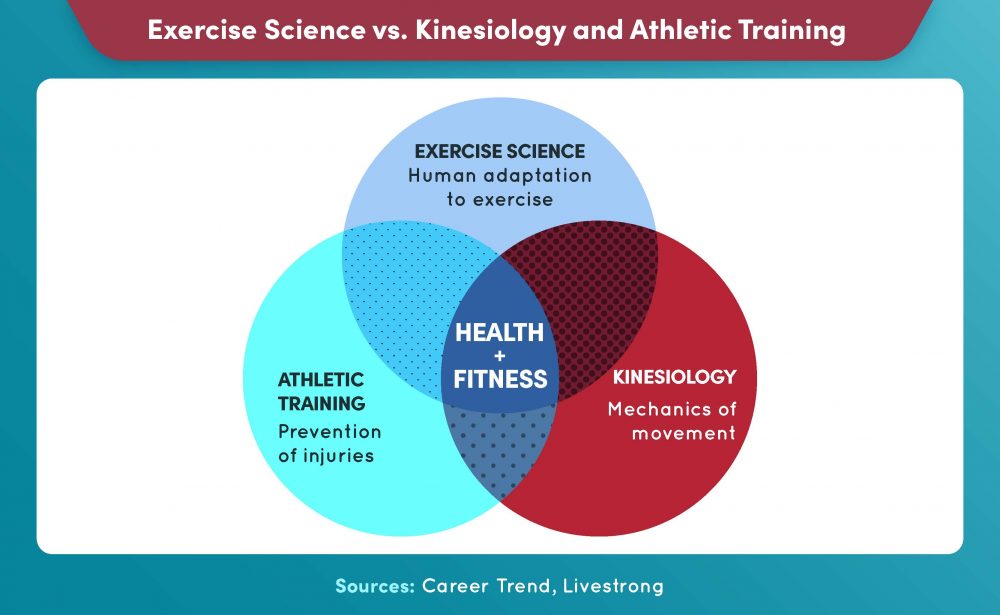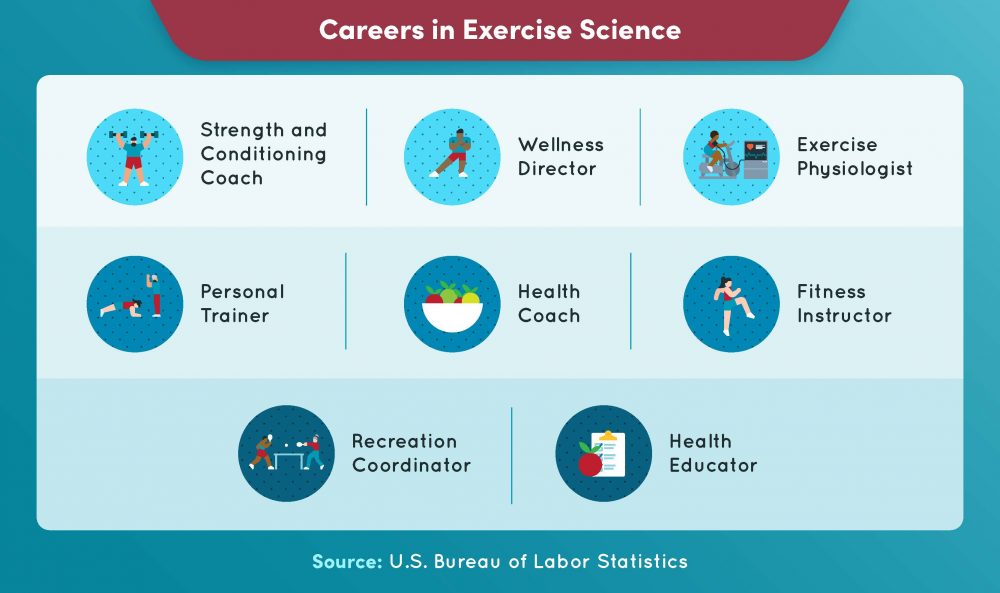What Can I Do with an Exercise Science Degree?What Can I Do with an Exercise Science Degree?What Can I Do with an Exercise Science Degree?
Table of Contents
A career in the health and fitness sector is an excellent option for individuals who understand the essential role of physical exercise in preventing and treating disease and promoting people’s overall well-being.

An exercise science degree prepares prospective health and fitness professionals with competencies to help people get in shape and live healthier lifestyles. It can provide them with the essential skills to help:
- Athletes improve their performance and endurance
- Students adopt and maintain healthy habits
- Patients recover from injury and disease
- Workers reduce injuries on the job
Professionals with exercise science training also help organizations meet their health and fitness goals. For example, individuals with an exercise science degree can work with companies to implement wellness programs or help community recreation centers promote and organize fitness activities.
What Is Exercise Science?
Exercise science is the study of how the human body responds to physical exercise. It draws on various disciplines, including biomechanics, sports nutrition, behavioral strategies, exercise program design, and sport psychology.
A scientific foundation of exercise science includes physiology — a branch of biology focused on studying living mechanisms. Physiology research includes studying what happens at the molecular and cellular levels and investigating external environmental impacts on the body.
Related areas of study are kinesiology and athletic training. While graduates with kinesiology and athletic training degrees may work in the same settings as individuals with exercise science degrees, the responsibilities of their roles vary.

Exercise Science vs. Kinesiology
Exercise science and kinesiology are closely related fields. These terms are often used interchangeably, but each area deals with different aspects of movement in the human body.
Kinesiology
Studies around kinesiology are focused on the mechanics of movement. Kinesiology involves the study of the body’s physical function and performance, and provides a foundation for studies in exercise science. Careers in kinesiology may include rehabilitation therapist, occupational therapist, or wellness consultant.
Exercise Science
Exercise science is concerned with how the human body adapts and responds to exercise. Individuals who specialize in this field of study can move into careers such as exercise physiologists, strength and conditioning coaches, and wellness directors.
Exercise Science vs. Athletic Training
While exercise science and athletic training are also related fields, they differ in focus and career opportunities.
Athletic Training
The American Medical Association (AMA) considers athletic training an allied healthcare profession. Trainers are certified health professionals who work alongside physicians and other medical professionals. Individuals who specialize in this field of study focus on injury prevention for athletes and athletic teams.
Exercise Science
An exercise science professional creates wellness and exercise routines for individuals of different ages and fitness capabilities. Individuals who specialize in this field of study can work to become personal trainers or recreation coordinators.
Exercise Science Resources
The following resources provide additional information about exercise science:
ACSM”s Health & Fitness Journal
American Kinesiology Association
American Society of Exercise Physiologists, “Definition of Exercise Physiology”
Elsevier, Human Movement Science
Livestrong.com, “Differences Between Exercise Physiology & Kinesiology”
ScienceDirect, “Exercise Science”
Taylor & Francis Online, Research Quarterly for Exercise and Sport
The Physiological Society, “Why Study Sport and Exercise Science?”
Careers in Exercise Science
The health benefits of exercise go beyond physical conditioning and making the body more resilient. According to a study published in Frontiers in Psychology, physical activity delivers positive “biological and psychological effects” that improve brain performance and mood.
Growing awareness of the physical and mental health benefits of living a healthy, active lifestyle drives demand for exercise professionals. As interest in fitness and health rises, the need for expert guidance from qualified exercise science professionals also increases. The U.S. Bureau of Labor Statistics (BLS) projects 19% job growth for athletic trainers and 10% for exercise physiologists between 2018 and 2028 — rates that exceed the average of all occupations combined for the same period.
Various jobs are available to graduates of exercise science degree programs. Here are examples of careers held by exercise science professionals.

Exercise Physiologist
An exercise physiologist develops fitness and exercise programs to treat both healthy people and individuals with acute or chronic illness.
- Exercise physiologist salary. Exercise physiologists earned a median annual salary of $49,170 as of May 2019, according to the BLS. Pay varies by experience, education level, industry, and other factors. For example, exercise physiologists working in government roles earned a median annual salary of $72,440, while those working in the offices of audiologists and physical, occupational, and speech therapists earned a median annual salary of $45,190.
- Job duties/role of an exercise physiologist. Before delivering treatment services, exercise physiologists analyze the medical histories of patients; conduct stress tests; and measure key health indicators, such as blood pressure and heart rhythm. They use this health data to develop the best exercise regimens for patients to achieve health improvements. An exercise program’s aims can include improving blood circulation or enhancing patients’ strength or endurance.
- Career path for an exercise physiologist. After receiving a bachelor’s degree in exercise science, kinesiology, or related field, exercise physiologists can decide to work independently or in hospitals and other healthcare settings. They can also pursue accreditation to make them more competitive in the marketplace. Certifications for exercise physiologists include the following: Certified Exercise Physiologist (EP-C), Certified Clinical Exercise Physiologist (CEP), and Exercise Physiologist Certified (EPC).
Strength and Conditioning Coach
Strength and conditioning coaches create programs to improve sport and athletic performance, prevent athletic injuries, and teach fitness skills.
- Strength and conditioning coach The median annual salary for strength and conditioning coaches is about $40,400 as of June 2020, according to PayScale. An entry-level candidate can expect to earn about $36,900, while a strength and conditioning coach with over 10 years of experience has a median annual salary of about $53,900.
- Job duties/role of a strength and conditioning coach. Strength and conditioning coaches lead by example in motivating individual athletes, small groups, and entire teams to excel physically. They develop strength and conditioning programs, according to the National Strength and Conditioning Association (NSCA) guidelines. To effectively demonstrate training techniques to athletes, strength and conditioning coaches should be physically fit themselves. They often collaborate with athletic trainers to help rehabilitate injured athletes.
- Career path for a strength and conditioning coach. The minimum education level for a strength and conditioning coach is a bachelor’s degree in kinesiology or related field. A strength and conditioning coach must demonstrate strong interpersonal and oral communication skills to regularly interact with student-athletes, as well as colleagues and the public. First aid, CPR, and automated external defibrillator (AED) certifications are typically required. Credentials such as the NSCA’s Certified Strength and Conditioning Specialist (CSCS) certification can help individuals be more competitive.
Wellness Director
A wellness director develops programs for organizations, such as corporations and community centers, to improve individuals’ physical and mental well-being.
- Wellness director The median annual salary for the role of wellness director is about $57,800 as of July 2020, according to PayScale. Annual pay varies by experience level. A wellness director with between five and nine years of experience earns about $59,100, while newly minted wellness directors earn about $48,300.
- Job duties/role of a wellness director. Wellness directors assess the health of individuals and determine fitness and health programs based on their findings. In company settings, they align the health needs of employees with the business’s financial goals. For example, a wellness director may recommend the creation of a smoking cessation program to improve employee health and boost productivity. The surgeon general’s office reports that companies lose $150 billion a year in productivity due to smoking and exposure to tobacco.
- Career path for a wellness director. A wellness director’s role is a leadership position, which means that experience with creating wellness plans and workout regimens is essential. Wellness directors can gain experience in various settings, including gyms, healthcare facilities, and fitness centers. Typical educational requirements for wellness directors include a bachelor’s degree in a health-related area of study, such as exercise science or kinesiology.
Personal Trainer
Personal trainers develop training programs for individuals and groups to enhance their physical fitness and health:
- Personal trainer salary. According to the BLS, which categorizes personal trainers as fitness trainers and instructors, the median annual personal trainer salary was $40,390 as of May 2019. However, the pay for personal trainers varies according to experience and other factors; the lowest 10% of earners brought in about $21,100 and the highest 10% earned more than $75,400.
- Job duties/role of a personal trainer. Personal trainers help their clients achieve physical fitness goals. Duties include assessing clients’ physical fitness and functional capacity, developing tailored exercise regimens, monitoring progress, and optimizing individual programs. Personal trainers often work in their clients’ homes or at a fitness facility, working with clients one-on-one or in groups.
- Career path for a personal trainer. A bachelor’s degree is preferred by most employers. Completing coursework that includes physiology, biomechanics, goal setting, fitness assessment, motivational strategies, and nutrition can help position a person for higher-paying roles. New trainers typically shadow experienced trainers in the field before training clients independently. Individuals seeking leadership roles, such as head trainer, can improve their opportunities to advance in their career with a bachelor’s degree in exercise science or related field and pursuing professional credentials such as the NSCA-Certified Personal Trainer (NSCA-CPT) certification.
Health Coach
Health coaches motivate individuals to build healthy habits, improve their well-being, and adopt healthy lifestyles to help prevent and manage chronic diseases.
- Health coach salary. The median annual salary for health coaches is about $46,800 as of July 2020, according to PayScale.
- Job duties/role of a health coach. Health coaches help individuals improve their health by developing safe exercise routines and monitoring progress. They also establish dietary plans, which means knowledge of nutrition is essential to the role. A Harvard Health Publishing article notes similarities between health coaching and talk therapy, pointing out that health coaches discuss health goals and strategies with clients much like therapists work with patients to change behaviors.
- Career path for a health coach. Employers of health coaches typically require an associate degree for new hires. Earning a bachelor’s degree can help position a person for higher-level health coach roles, but qualifications vary by employer. Some only consider candidates with certifications related to nursing, nutrition, or health coaching from accrediting agencies such as the National Commission for Certifying Agencies (NCCA) and the Accrediting Bureau of Health Education Schools (ABHES).
Careers in Exercise Science Resources
The following resources provide additional information about careers in science:
American College of Sports Medicine, “Careers in Exercise Science”
Career Trend, “Athletic Training vs. Exercise Science”
Commission on Accreditation of Allied Health Education Programs, “Exercise Science”
Houston Chronicle, “What Kind of Bachelor’s Degree Should an Athletic Trainer Get?”
National Athletic Trainers’ Association, “Profile of Athletic Trainers”
Shape America, “Fields of Study”
Types of Exercise Science Degrees
An exercise science degree — either a bachelor’s degree or a master’s degree — can prepare individuals for a successful career in the fitness and health industry. The following sections provide information about requirements, coursework, and career options for each type of exercise science degree.
Bachelor’s Degree
- Typical requirements to enroll in a bachelor’s degree program include getting a high school diploma or a GED. Candidates must submit their official high school transcripts for consideration. Some programs require a minimum cumulative GPA from the high school averaging 2.5 on a 4.0 scale. Those with a lower GPA may be considered as well, depending on the program.
- Types of courses. Bachelor of Exercise Science (BEXSc) degree programs typically include courses in biomechanics and kinesiology, fitness management, stress management, health nutrition, and exercise management, among other classes.
- Career options. BEXSc programs can prepare graduates to serve in multiple roles: athletic trainer, personal trainer, exercise physiologist, coach, wellness director, and physiotherapist, to name just a few roles. A BEXSc can also prepare students for credentials such as EP-C, CEP, EPC, CSCS, and NSCA-CPT, as well as the following:
- Certified Health Education Specialist (CHES)
- Tactical Strength and Conditioning Facilitator (TSAC-F)
- EXOS Performance Specialist (XPS)
- EXOS Fitness Specialist (XFS)
Master’s Degree
- Most programs consider applicants with a minimum cumulative GPA of 3.0 on a 4.0 scale. However, there may be exceptions based on the program. Candidates must submit their official transcripts from previously attended colleges or universities with their applications. Many programs require that students take the GMAT or the GRE exam.
- Types of courses. Master’s degree programs typically include coursework that includes biology, anatomy, physiology, nutrition, and kinesiology, as well as opportunities for hands-on clinical work.
- Career options. Graduates of master’s degrees are prepared to pursue leadership roles as athletic trainers and exercise physiologists.
Prepare to Advance Your Career with a Bachelor’s Degree in Exercise Science
Growing interest in wellness, nutrition, and recovery services is among the top trends driving growth in the fitness sector, an industry that generated $94 billion in revenues in 2019, according to the International Health, Racquet & Sportsclub Association (IHRSA). Professionals with the knowledge to run health, fitness, and wellness programs in a variety of settings should be well-positioned to benefit from industry growth.
A bachelor’s degree in exercise science can prepare individuals passionate about health and fitness with the skills and knowledge to advance in their careers. It also equips them to attain industry certifications that are required for leadership roles.
Students wondering what they can do with an exercise science degree have a wide range of career options. Degree holders can pursue roles in health training and coaching, exercise physiology, community health, wellness program management, or athletic training. They can promote well-being and proper nutrition and help patients recover from injuries at rehabilitation centers, hospitals, schools, community centers, business offices, and more.
Infographic Sources
Career Trend, Athletic Training Vs. Exercise Science
Livestrong, Differences Between Exercise Physiology & Kinesiology
U.S. Bureau of Labor Statistics, Occupational Outlook Handbook
Additional Sources
American College of Sports Medicine, “ACSM Exercise Professional Licensure Statement”
Career Trend, Athletic Training Vs. Exercise Science
Livestrong, Differences Between Exercise Physiology & Kinesiology
Be Brave
Bring us your ambition and we’ll guide you along a personalized path to a quality education that’s designed to change your life.

